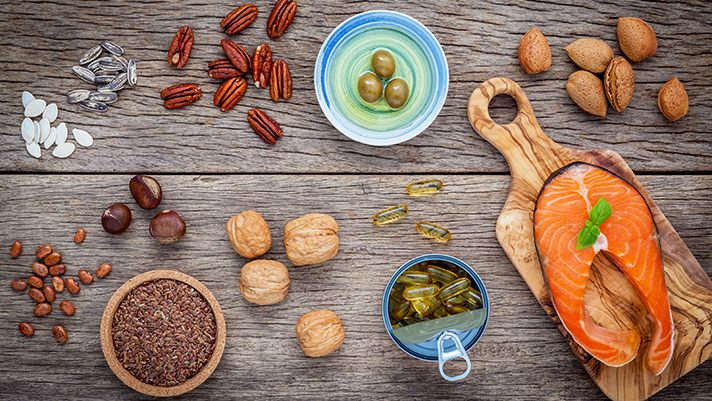The health-enhancing properties of omega-3 fatty acids are well known and recommended by the World Health Organisation (WHO), the NHS and European Food Safety Authority. What’s more, the DHA fatty acid in omega-3 is particularly important for maintaining good eye and brain function throughout life.* But, while most of us know about the positive effects of the omega-3 fatty acids, we don’t always get enough of these vital nutrients from nature.
More articles about omega-3 here
Omega-3 through seafood
Omega-3 fatty acids from marine sources have proven health benefits and are known as long-chain polyunsaturated fatty acids. They include EPA (eicosapentaenoic acid) and DHA (docosahexaenoic acid). Oily fish such as mackerel, cod, salmon, anchovy, and herring, as well as phytoplankton and algae, contain omega-3 fatty acids.
Unfortunately, surveys such as this one reveal that the majority of Britons do not eat enough fish.
Other sources of omega-3
You can also obtain omega-3 from soil-based plants and seeds like flax and chia. Omega-3 fatty acids from embryophytes (land plants) are shorter and typically ALA (alfa-linolenic acid), which doesn’t have the same health benefits on its own as EPA and DHA. EPA and DHA can be produced from an ALA, but not in sufficient amounts.
The most important food sources of omega-3
There are various sources of omega-3, a few of which are list below together with the form of omega-3 fatty acids they contain.
- Flax seeds (ALA)
- Hemp seeds (ALA)
- Chia seeds (ALA)
- Sardines, herring (DHA+EPA)
- Mackerel (DHA+EPA)
- Salmon (DHA+EPA)
- Halibut (DHA+EPA)
- Tuna (DHA+EPA)
- Swordfish (DHA+EPA)
- Clams (DHA+EPA)
- Cod (DHA+EPA)
- Flounder (DHA+EPA)
- Red meat (from fatty tissue in herbivorous animals, ALA)
- Algae (DHA+EPA)
Not getting enough omega-3 in your diet?
If you’re not getting enough omega-3 through your diet, either because you don’t eat fish or you don’t eat enough fish, you can always take omega-3 supplements. There are many products to choose from but one teaspoon of cod liver oil (5 ml) is a good top-up of omega-3. If you don’t want to ingest cod liver oil as a syrup, you can take cod liver oil capsules, which make it easier for you to get enough omega-3.
Remember your cod liver oil – every single day!
*Beneficial effect is obtained with a daily intake of 250 mg of DHA

